| Listing 1 - 10 of 49 | << page >> |
Sort by
|
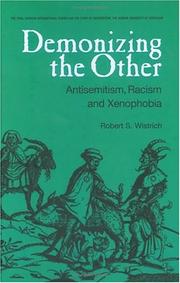
ISBN: 9781135852443 1135852448 9057024977 9789057024979 9780203727249 020372724X 1299286569 9781135852511 9781135852580 9780415516198 1135852510 Year: 1999 Publisher: Amsterdam Abingdon Harwood Academic Marston
Abstract | Keywords | Export | Availability | Bookmark
 Loading...
Loading...Choose an application
- Reference Manager
- EndNote
- RefWorks (Direct export to RefWorks)
At the close of the twentieth century the stereotyping and demonization of 'others', whether on religious, nationalist, racist, or political grounds, has become a burning issue. Yet comparatively little attention has been paid to how and why we fabricate images of the 'other' as an enemy or 'demon' to be destroyed. This innovative book fills that gap through an interdisciplinary, cross-cultural approach that brings together a distinguished array of historians, anthropologists, psychologists, literary critics, and feminists.The historical sweep covers Greco-Roman Antiquity, the MIddle Ages,
Book
ISBN: 1282233734 9786613811479 0889206317 9780889206311 Year: 1986 Publisher: Waterloo, Ont., Canada : Published for the Canadian Corporation for Studies in Religion by Wilfrid Laurier University Press,
Abstract | Keywords | Export | Availability | Bookmark
 Loading...
Loading...Choose an application
- Reference Manager
- EndNote
- RefWorks (Direct export to RefWorks)
The period since the close of World War II has been agonizingly introspective-not least because of the pain of reassessing Christianity's attitude to Judaism. The early Christian materials have often been examined to assess their role in the long-standing negative attitude of Christians to Jews. The motivation for the early church's sometimes harsh attitude was partly theological-it needed to define itself over against its parent-and partly sociological-it needed to make clear the line that divided the fledgling group of Christian believers fromt he group with which it was most likely to b
Christianity and antisemitism. --- Church history --- Judaism --- Relations --- Christianity. --- Paul,
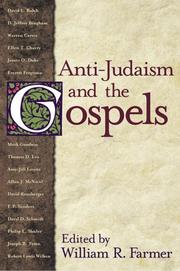
ISBN: 1283207303 9786613207302 1441179240 9781441179241 1563382709 9781563382703 Year: 1999 Publisher: Harrisburg, Pa. Trinity Press International
Abstract | Keywords | Export | Availability | Bookmark
 Loading...
Loading...Choose an application
- Reference Manager
- EndNote
- RefWorks (Direct export to RefWorks)
When and under what circumstances did the Gospel texts begin to serve anti-Jewish ends? Can it be said, accurately and fairly, that the evangelists were anti-Jewish? Are there tendencies in the Gospels that were originally intended by the evangelists to injure the Jewish people or their religion, or to work against the interests of the Jewish people and/or their religion?These and other issues were addressed in a three-year research project that culminated in a fall 1996 convocation, at which five major research papers were presented with two respondents to each paper. The papers and responses
Judaism (Christian theology) --- Christianity and antisemitism --- History of doctrines --- History. --- Bible. --- Criticism, interpretation, etc.
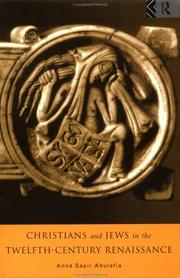
ISBN: 113499026X 1280325623 0203202333 9780203202333 9780415000123 0415000122 0203202368 9780203202364 9786610325627 6610325626 9781134990269 9781134990214 9781134990252 9780415861830 0415861837 1134990251 Year: 1995 Publisher: London New York Routledge
Abstract | Keywords | Export | Availability | Bookmark
 Loading...
Loading...Choose an application
- Reference Manager
- EndNote
- RefWorks (Direct export to RefWorks)
The twelfth century was a period of rapid change in Europe. The intellectual landscape was being transformed by new access to classical works through non-Christian sources. The Christian church was consequently trying to strengthen its control over the priesthood and laity and within the church a dramatic spiritual renewal was taking place. Christians and Jews in the Twelfth-Century Renaissance reveals the consequences for the only remaining non-Christian minority in the heartland of Europe: the Jews. Anna Abulafia probes the anti-Jewish polemics of scholars who used the new
Judaism --- Christianity and other religions --- Christianity and antisemitism. --- Church history --- Antisemitism and Christianity --- Brotherhood Week --- Relations --- Christianity. --- Judaism. --- Christianity and antisemitism --- Civilization, Medieval --- Judaïsme --- Christianisme --- Christianisme et antisémitisme --- Civilisation médiévale --- Eglise --- Christianity --- Histoire
Book
ISBN: 9781316606599 1316606597 9781107152465 1107152461 9781316591284 1316984222 1316981630 131659128X Year: 2016 Publisher: New York Cambridge University Press
Abstract | Keywords | Export | Availability | Bookmark
 Loading...
Loading...Choose an application
- Reference Manager
- EndNote
- RefWorks (Direct export to RefWorks)
From its earliest days, Christianity has viewed Judaism and Jews ambiguously. Given its roots within the Jewish community of first-century Palestine, there was much in Judaism that demanded Church admiration and praise; however, as Jews continued to resist Christian truth, there was also much that had to be condemned. Major Christian thinkers of antiquity - while disparaging their Jewish contemporaries for rejecting Christian truth - depicted the Jewish past and future in balanced terms, identifying both positives and negatives. Beginning at the end of the first millennium, an increasingly large Jewish community started to coalesce across rapidly developing northern Europe, becoming the object of intense popular animosity and radically negative popular imagery. The portrayals of the broad trajectory of Jewish history offered by major medieval European intellectual leaders became increasingly negative as well. The popular animosity and the negative intellectual formulations were bequeathed to the modern West, which had tragic consequences in the twentieth century. In this book, Robert Chazan traces the path that began as anti-Judaism, evolved into heightened medieval hatred and fear of Jews, and culminated in modern anti-Semitism.
Antisemitism --- Christianity and antisemitism --- Judaism --- Christianity and other religions --- 296*82 --- Christianity --- Syncretism (Christianity) --- Religions --- Jews --- Semites --- Antisemitism and Christianity --- 296*82 Dialoog joden - christenen --- Dialoog joden - christenen --- History --- Relations --- Religion --- Christianity and antisemitism. --- History.
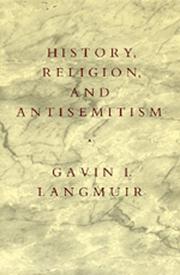
ISBN: 0520912268 0585181497 9780520912267 9780585181493 0585153671 9780585153674 0520077288 0520068432 0520061411 9780520077287 Year: 1990 Publisher: Berkeley University of California Press
Abstract | Keywords | Export | Availability | Bookmark
 Loading...
Loading...Choose an application
- Reference Manager
- EndNote
- RefWorks (Direct export to RefWorks)
Gavin I. Langmuir's work on the formation and nature of antisemitism has earned him an international reputation. In History, Religion, and Antisemitism he bravely confronts the problems that arise when historians have to describe and explain religious phenomena, as any historian of antisemitism must. How, and to what extent, can the historian be objective? Is it possible to discuss Christian attitudes toward Jews, for example, without adopting the historical explanations of those whose thoughts and actions one is discussing? What, exactly, does the historian mean by "religion" or "religious"? Langmuir's original and stimulating responses to these questions reflect his inquiry into the approaches of anthropology, sociology, and psychology and into recent empirical research on the functioning of the mind and the nature of thought. His distinction between religiosity, a property of individuals, and religion, a social phenomenon, allows him to place unusual emphasis on the role of religious doubts and tensions and the irrationality they can produce. Defining antisemitism as irrational beliefs about Jews, he distinguishes Christian anti-Judaism from Christian antisemitism, demonstrates that antisemitism emerged in the twelfth and thirteenth centuries because of rising Christian doubts, and sketches how the revolutionary changes in religion and mentality in the modern period brought new faiths, new kinds of religious doubt, and a deadlier expression of antisemitism. Although he developed it in dealing with the difficult question of antisemitism, Langmuir's approach to religious history is important for historians in all areas.
Antisemitism --- Christianity and antisemitism --- Historiography --- Religion --- Study and teaching --- Religion - Historiography --- Religion - Study and teaching --- ANTISEMITISM --- SOCIAL SCIENCE --- Social Science --- Social science --- Antisemitism. --- Christianity and antisemitism. --- Historiography. --- Study and teaching.
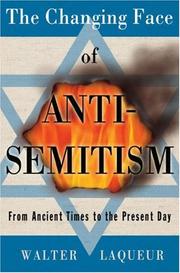
ISBN: 1283098083 9786613098085 0199774730 9780199774739 9781283098083 9780195304299 0195304292 9780195341218 019534121X 6613098086 0199840571 9780199840571 Year: 2006 Publisher: New York, N.Y. : Oxford University Press,
Abstract | Keywords | Export | Availability | Bookmark
 Loading...
Loading...Choose an application
- Reference Manager
- EndNote
- RefWorks (Direct export to RefWorks)
For thirty years the director of the Wiener Library in London-the leading institute for the study of anti-Semitism-Walter Laqueur here offers both a comprehensive history of anti-Semitism as well as an illuminating look at the newest wave of this phenomenon. Laqueur begins with an invaluable historical account of this pernicious problem, tracing the evolution from a predominantly religious anti-Semitism-stretching back to the middle ages-to a racial anti-Semitism that developed in the late 19th and early 20th centuries. The author then uses this historical account as backdrop to a brilliant analysis of the newest species of anti-Semitism, explaining its origins and rationale, how it manifests itself, in what ways and why it is different from anti-Semitism in past ages, and what forms it may take in the future. The book reveals that what was historically a preoccupation of Christian and right-wing movements has become in our time even more frequent among Muslims and left-wing groups. Moreover, Laqueur argues that we can't simply equate this new anti-Semitism with anti-Zionism and write it off as merely anti-Israel sentiments. If Israel alone is singled out for heated condemnation, is the root of this reaction simply anti-Zionism or is it anti-Semitism? Here is both a summing up of the entire trajectory of anti-Semitism--the first comprehensive history of its kind--and an exploration of the new wave of anti-Semitism. "Walter Laqueur provides us with powerful new insights into an age-old problem. Distinguished scholarship and an authoritative moral voice are the hallmarks of this important book. Anyone wanting to understand the history and persistence of anti-Jewish hatred should read it." --Abraham H. Foxman, National Director, Anti-Defamation League
Antisemitism --- Christianity and antisemitism. --- Judaism --- Christianity and other religions --- Islam --- Brotherhood Week --- Antisemitism and Christianity --- History. --- Relations --- Christianity. --- Judaism. --- Islam.
Book
ISBN: 1526144883 1526144875 9781526144874 9781526144881 1526144867 9781526144867 Year: 2021 Publisher: Manchester
Abstract | Keywords | Export | Availability | Bookmark
 Loading...
Loading...Choose an application
- Reference Manager
- EndNote
- RefWorks (Direct export to RefWorks)
This book presents a radical reconsideration of the role of key players in developing an organised, politically oriented antisemitism in Vienna in the decades leading to the 1938 Anschluss. It pays particular attention to the clergy and how their antisemitism fitted the worldview of an authoritarian, hierarchical society.
Antisemitism --- Christianity and antisemitism --- History --- Christlichsoziale Partei. --- Antisemitism. --- Austria. --- Authoritarianism. --- Church. --- Europe. --- Habsburg. --- Liberalism. --- Modernism. --- Nationalism. --- Vienna.
Book
ISBN: 0804775621 9780804775625 9780804770552 0804770557 Year: 2010 Publisher: Stanford, Calif. Stanford University Press
Abstract | Keywords | Export | Availability | Bookmark
 Loading...
Loading...Choose an application
- Reference Manager
- EndNote
- RefWorks (Direct export to RefWorks)
This book argues that the representation of Jews in European literature has little to do with actual, human Jews, but rather is derived from the conception of Jews as Christianity's paradigmatic Other, eternally reenacting their morally ambiguous New Testament role as the Christ-bearing and -killing chosen people of God.
Russian literature --- Jews in literature. --- Antisemitism in literature. --- Christianity and antisemitism --- Antisemitism and Christianity --- Christianity and other religions --- History and criticism. --- Jewish authors --- History. --- Judaism
Book
ISBN: 1282399403 9786612399404 9047442911 9789047442912 9789004168510 9004168516 9789004186217 9004186212 Year: 2009 Publisher: Leiden Boston Brill
Abstract | Keywords | Export | Availability | Bookmark
 Loading...
Loading...Choose an application
- Reference Manager
- EndNote
- RefWorks (Direct export to RefWorks)
As Adolf Hitler strategised his way to power, he knew that it was necessary to gain the support of theology and the Church. This study begins two hundred years earlier, however, looking at roots of theological anti-Semitism and how Jews and Judaism were constructed, positively and negatively, in the biblical interpretation of German Protestant theology. Following the two main streams of German theology, the salvation-historical and the Enlightenment-oriented traditions, it examines leading exegetes from the 1750s to the 1950s and explores how theology legitimises or delegitimises oppression of Jews, in part through still-prevailing paradigms. This is the first comprehensive analysis of its kind, and the result of the analysis of the interplay between biblical exegesis and attitudes to Jews and Judaism is a fascinating and often frightening portrait of theology as a servant of power. This book is also available in paperback.
Antisemitism --- Christianity and other religions --- Judaism (Christian theology) --- Judaism --- Theology, Doctrinal --- Christianity --- Syncretism (Christianity) --- Religions --- History. --- History of doctrines. --- Relations --- History --- Bible --- Christianity and antisemitism --- Criticism, interpretation, etc.
| Listing 1 - 10 of 49 | << page >> |
Sort by
|

 Search
Search Feedback
Feedback About UniCat
About UniCat  Help
Help News
News